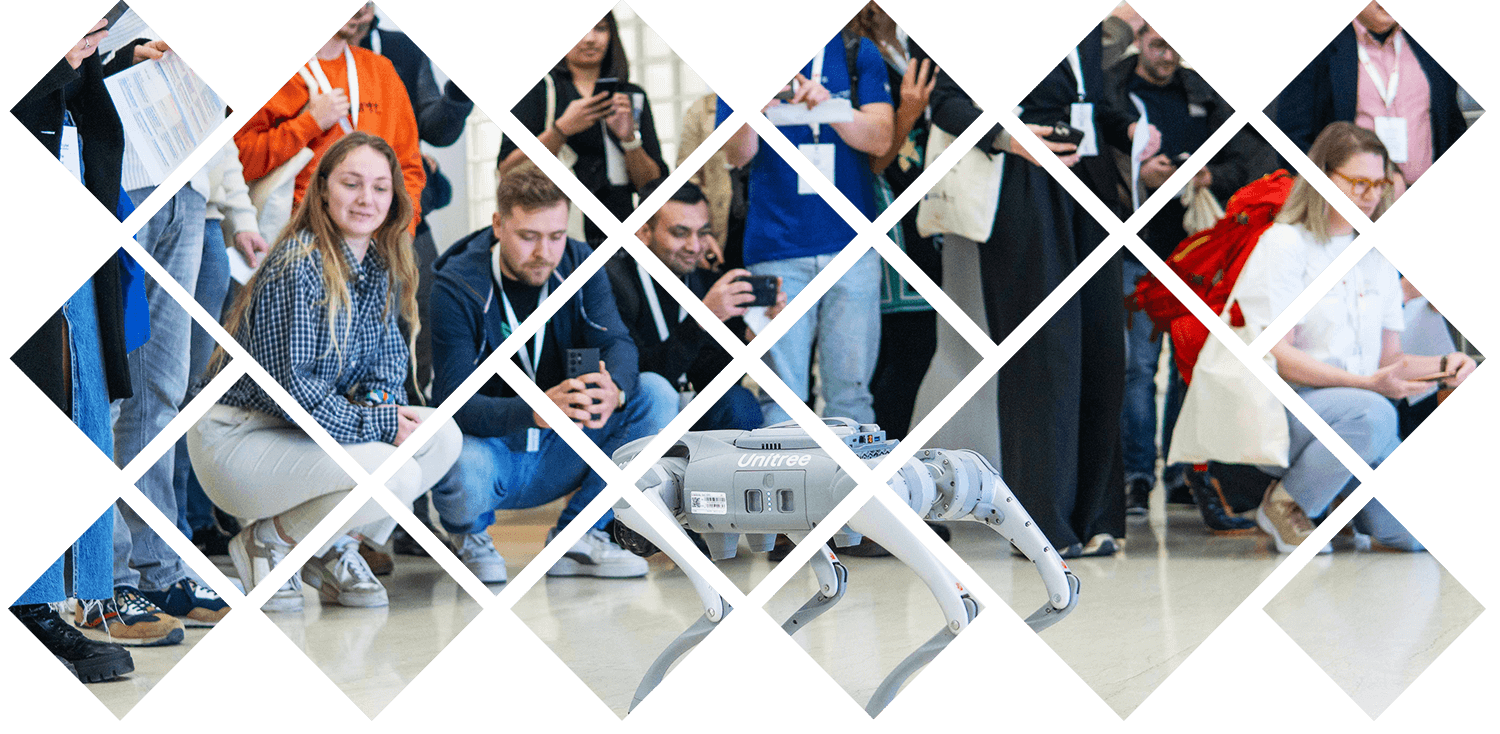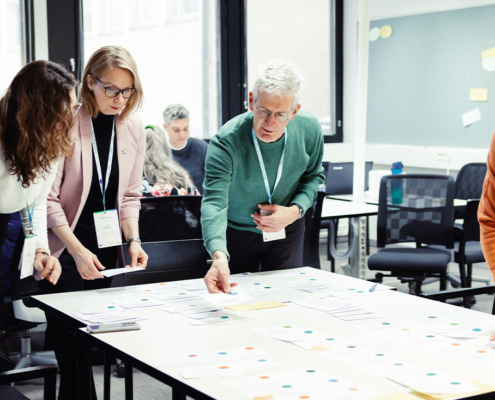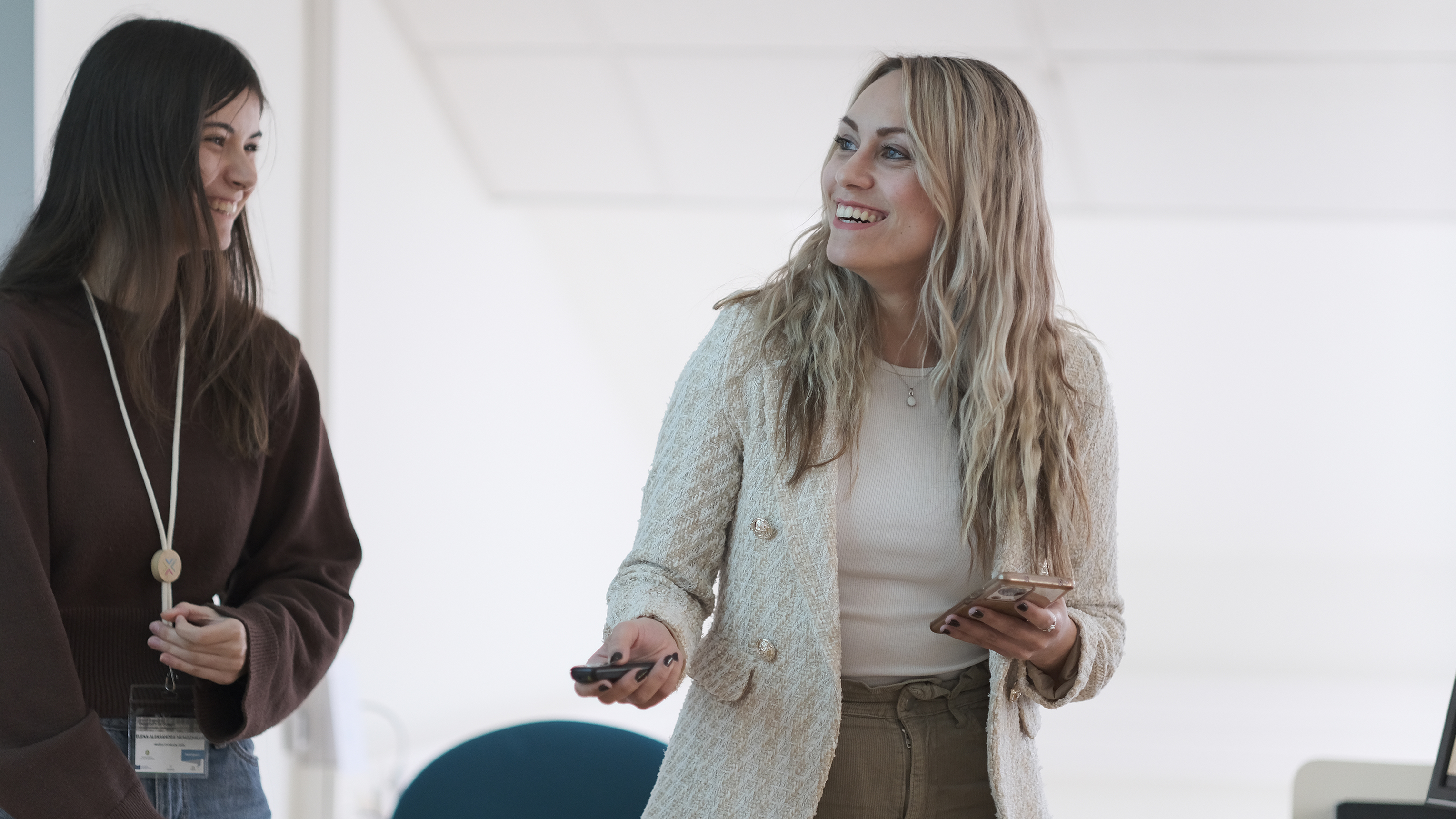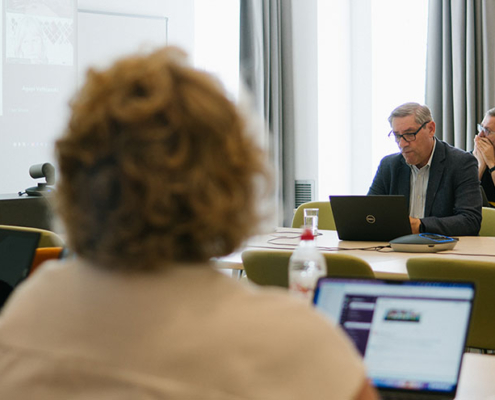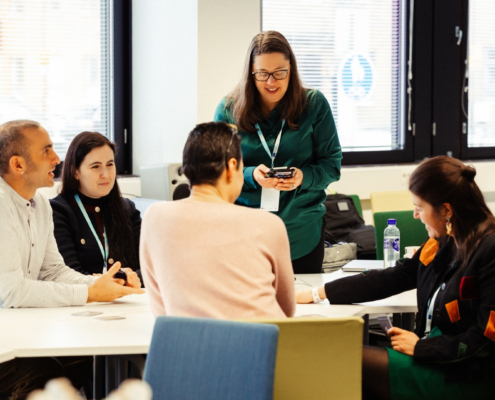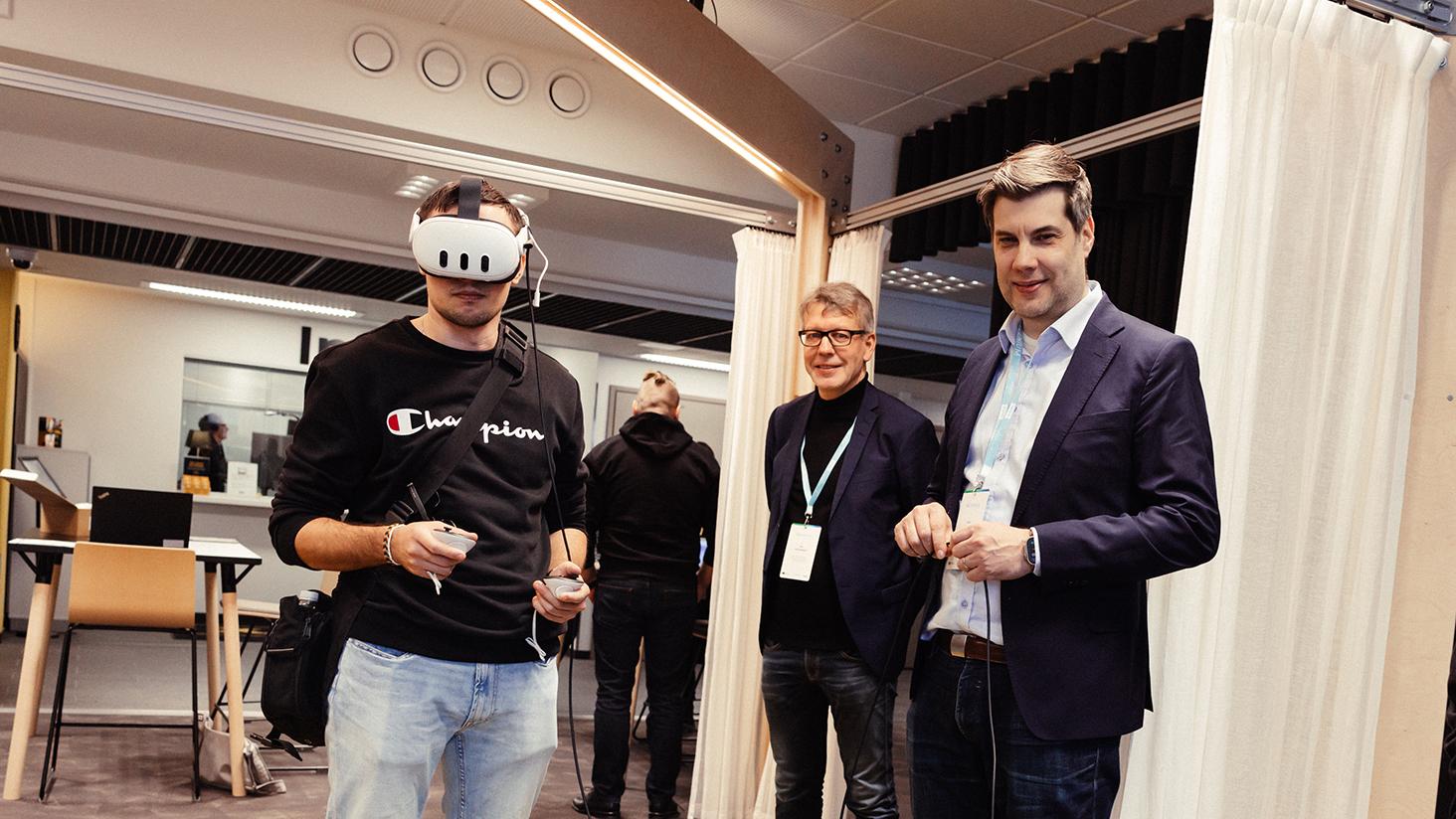Education Lab
The Education Lab is any space where teaching and learning can be innovated or developed in INGENIUM European University.
It is an experimental, decentralised teaching and learning network that utilises diverse expertise, educational spaces and facilities across the INGENIUM European University.
The Education Lab connects education, stakeholders, and RDI to search for solutions to wicked problems in society. In the Lab, interdisciplinary groups will work on authentic cases.
Education Lab has compiled an exhaustive list of the different facilities and expertise available at each different partner university. As such, the Lab contains a number of virtual and physical distributed spaces where staff, students, and stakeholders can co-create new solutions for authentic challenges, learn from each other, and network.
Innovation projects
To promote joint innovation projects, the INGENIUM European University has launched two initiatives:
- Joint Education Lab Projects
- Best New Media Teaching Practices
See more information about these initiatives below.
Joint Education Lab Projects
The INGENIUM European University is funding a selection of Joint Education Lab Projects to help transform ideas into reality. A joint education lab project develops or spreads innovative teaching methods, pedagogies, or products throughout the INGENIUM alliance and beyond. The ideas do not have to be fully realised, as it is important to allow for experimentation during implementation.
It’s a yearly call for the projects and the third call for the Joint Education Lab projects has closed on 31.10.2025.
The project could involve, for example, co-teaching, co-creation with students, or interdisciplinary collaboration to solve novel problems, develop teaching methods or learning environments, or create new micro-credentials.
The projects can have their mobility, materials, and other justified expenses covered by their university to help get their projects off the ground. Faculty, education, teaching, and RDI specialists are invited to submit proposals for Joint Education Lab Projects.
The themes of the third call:
- Micro-credentials: Create new joint micro-credentials or adapt an existing micro-credential to be offered to the alliance.
- Innovative teaching and learning: Create or share innovative teaching or assessment practices and expertise throughout the alliance.
- Joint development project: Create a joint education development project between two or more partner universities.
- Learning environments and platforms: Innovations in learning environments, hybrid teaching, or VR.
- Lifelong learning and business partnerships: Foster connections with local communities, develop connections with business and industry or develop lifelong learning offerings.
How are the projects assessed?
The Innovation Committee has set the selection criteria and priority will be given to Joint Education Lab Project proposals focusing on:
- Innovation: Knowledge-sharing, co-creation and interdisciplinarity. The goal is to support networking and knowledge-sharing within the INGENIUM European University.
- Cooperation between different INGENIUM institutions to share facilities and expertise, facilitating knowledge transfer and the development of joint expertise.
- Multilingualism: Including, for example, intercultural communication, accessibility, inclusive language, and linguistic diversity.
- Transferability: Dissemination of results in various ways that help shape their scientific and professional fields or have real-world applicability, such as business or classroom applications.
Out-of-the-box proposals are welcome. Proposals should actively involve educators, students and stakeholders in their development or implementation.
Find partners and apply with your idea!
Those interested in preparing an application should search for potential partners within INGENIUM European University. Use the Education Lab inventory below, the CONNECT portal, and each university’s website. You can also contact your local INGENIUM office to ask for help. For more information about the details of the Joint Education Lab Project funding, please refer to the Frequently Asked Questions section below. If you have any questions, contact us at INGENIUM@xamk.fi.
The call for applications has closed on 31 October 2025.
INGENIUM Education Labs
Frequently Asked Questions
What is the INGENIUM Education Lab?
An education lab is any place where teaching and learning are developed or innovated, whether a dedicated educational research lab or a classroom. The Education Lab is an experimental, decentralised teaching and learning hub that utilises diverse expertise, educational spaces and facilities across the INGENIUM European University.
Its primary goal is to encourage collaboration and knowledge-sharing to develop innovative teaching methodologies and products with real-world applications. The Education Lab brings together experts from different fields to tackle common challenges educators and society face.
Can anyone apply?
Yes, any staff member with a valid employment contract for the duration of the Joint Education Lab Project can apply. Before preparing your project application, please discuss it with your supervisor or department head and your INGENIUM WP5 coordinator.
How many people should be in the Joint Education Lab Project team?
It depends. The project lead assembles the project team. At least two universities should be involved. The number of people depends on the project’s scope. However, the project must be financially feasible.
How many people should fill out the application form?
Only the project lead should complete the application form.
How can I find people from other INGENIUM European University institutions to collaborate with?
The Education Lab Inventory, and the Connect portal are valuable tools for finding the right collaboration partners as well as individual institution webpages. We recommend you contact the experts directly and pitch your idea for a joint education lab project.
What financial support do I get to implement our Joint Education Lab Project?
Before you apply for funding, please contact your local INGENIUM coordinator and speak to your supervisor to make sure they are aware of your project application.
The financial support is intended to enable project participants to travel for short visits when necessary and to cover any related material costs. Each university can award a maximum of 20,000 euros, which they decide how to split between the different education lab projects or award to a single project. Be prepared to discuss with your project team openly and in a collegial spirit if you do not get all the funds you have applied for. It may be necessary to adjust the scope and ambitions of your project according to the new fiscal realities.
Is mobility a requirement for all Joint Education Lab project participants?
No, mobility is not a requirement.
I participated in the INGENIUM Staff Academy and/or the Joint Research Projects. Can I apply for a Joint Education Lab Project?
Yes, you can. Please mention this on the application form.
What are the deliverables of the Joint Education Lab project?
The deliverables naturally depend on the project’s scope. However, the Project lead and the team should host and record a webinar on the project to share knowledge within the broader INGENIUM community at the latest a month after the project timeline ends. The webinar recording will be published on the INGENIUM website. The webinar will focus first on the effectiveness of the collaboration between INGENIUM partners and then on the project’s results. There should also be sufficient time for a general discussion and audience questions.
The webinar report should address the following topics:
Joint Education Lab Project Webinar
- What is the problem being addressed, and why is it important?
- What is the approach to solving the problem?
- How does your project generate impact?
- How did the project achieve its goals:
- What were the achievements and results to date,
- how did collaboration proceed among INGENIUM partners,
- are there plans to continue cooperation after the funding period?
What is the timeframe for implementing and reporting our Joint Education Lab project?
The project must be implemented within nine months of being granted funding.
What if I need to withdraw from the joint education lab project?
If you have to withdraw from the Joint Education Lab Projects and cannot find a replacement from your institution, please get in touch with your local INGENIUM Project Coordinator and your project partners. Please also inform Xamk WP5 coordinators at: ingenium@xamk.fi.
What are the evaluation criteria?
The evaluation criteria provide a structured way to assess the quality of proposals. The criteria are categorised into specific aspects (project feasibility and pedagogical review) and rated on a 1—5 scale, making the evaluation more objective.
Grading Criteria 1—5:
Poor (1): The lowest rating, indicating significant issues or dissatisfaction.
Fair (2): Below average, with noticeable problems or shortcomings.
Well (3): Average performance, meeting basic expectations.
Very Well (4): Above average, exceeding expectations in several areas.
Excellent (5): The highest rating, indicating outstanding performance or satisfaction.
All the key points bellow are graded on the 1—5 scale.
The Joint Education Lab Project’s feasibility is assessed as follows:
Project Overview
Budget
- The project includes a detailed cost breakdown, covering materials and supplies, equipment, travel, and indirect costs.
- Each budget item is clearly justified, explaining its necessity for the project’s success.
- The project’s costs are allocated fairly between the partners.
- If needed, other potential funding sources are identified, with consideration for cost-sharing or matching funds.
General Feasibility
- The project proposal is well-written, and the idea is well-justified.
- The project’s scope is feasible and achievable within the proposed timeline.
- The project deepens cooperation or supports knowledge transfer between INGENIUM partners.
- The project is aligned with INGENIUM’s values.
- The project’s outputs and impact are clear.
The key pedagogical evaluation points include:
Pedagogical Review
Innovativeness
- The project introduces new concepts, approaches, or techniques for one or more of the partner universities.
- The joint project challenges existing educational paradigms or develops new teaching methodologies or technologies.
- The joint project utilises co-creation methods or has student participation
Partner cooperation
- Educational expertise, spaces, and facilities are effectively used by a diverse team of experts, students, and partners.
- There are links to industry or cooperation with other educational institutions.
- The project has clear potential for continuation or serves as a foundation for future collaboration.
- The are connections between research and education activities.
Multilingualism
- Teaching methods or educational products are accessible.
- The project supports teaching or facilitating learning in multiple languages (i.e., language diversity).
- The joint product develops intercultural communication skills, acknowledges cultural differences, and values.
Impact & Transferability
- The project results are disseminated widely.
- The project solves real-life problems effectively.
- The project aligns with the INGENIUM European University’s sustainability goals.
Best New Media Teaching Practices
A competition for Best New Media Teaching Practices, with two categories: Innovations in Participatory Learning and Young Innovators. The Innovations in Participatory Learning awards will be given to designers of new learning environments, including major adaptations of existing models of gaming, world-building, social networking, or other virtual environments, and/or the development of entirely new programs. The Young Innovators awards will be given to forward-thinking, conceptually exciting, and original participatory learning projects, where emerging innovators will be able to bring their most visionary ideas from the “garage” stage to implementation.
Call for Ideas is Closed
Are you ready to shape the future of education?
Then submit your idea to INGENIUM European University’s The Best New Media Teaching Practices competition. Submit your innovative ideas in participatory learning and share them with the INGENIUM European University Alliance and beyond!
Two exciting categories in this call:
- Innovations in Participatory Learning:
For educators and teaching staff reimagining learning environments to create inclusive, participatory learning experiences, whether through adapting gaming, world-building, and social networking into online or physical classrooms or creating entirely new programs. - Young Innovators Awards:
For emerging innovators who are ready to turn bold, conceptual ideas into reality. Take your projects from the “garage” to the global stage! Young Innovators Awards is open to apply for INGENIUM students and staff.
Both categories are open for all disciplines! The term new media in the competition’s name means that we are looking for ideas of teaching and learning that utilize digital environments, the internet, digital devices, interactive platforms and so on.
Why Participate?
- Compete for the chance to present your innovative ideas at the 10 Days of Ingenium 2026 event in Romania or Sweden. Your travel and accommodation costs will be covered.
- Gain recognition and receive valuable feedback to refine and develop your concept further.
How to Enter:
- Submit a short information form (incl. a short concept synopsis and a summary of the proposal’s novelty).
- Attach a presentation of the key aspects of your proposal. (Max. 6 slides, PDF)
Key Dates to Remember:
- Registration opens: April 7, 2025
- Submission deadline: September 30, 2025
- Winners announced: November 2025
- Prize trip to 10 Days of INGENIUM 2026, either Gheorghe Asachi Technical University of Iasi, Romania 26.-30.1.2026 or University of Skövde, Sweden 2.-6.2.2026.
Evaluation
A specially appointed evaluation board will conduct the evaluation, and the final selection will be made by November 2026 at the latest. One winning proposal will be selected from each category. The evaluation criteria outlined below may also serve as a helpful guide when preparing your submission, highlighting the key aspects that will be assessed.
Evaluation Criteria:
Innovativeness
- Originality: What is the novelty of the designed learning environments/concepts?
- Technology: How effectively does the innovation introduce or leverage new technologies (for example, gaming, world-building, social networking or other virtual environments) in the learning environment?
- Participatory Methods: How well does the proposal ensure participatory learning in practice? (Incl. Interactive and co-creative processes)
- Disruption: Does the proposal challenge existing education and create a new program/concept?
Impact and Transferability
- Relevance: How inspiring and engaging is the innovation for its intended audience?
- Scalability & Adaptability: Can the concept be applied to different disciplines of target groups? / Can it be shared within the INGENIUM European University?
- Evaluation: Are there clear methods for assessing the impact on learning and engagement?
- Long-term Impact: Is there a scope for future innovation development?
Participants must still be registered staff members or students at INGENIUM institutions in February 2026, as the award can only be granted to individuals affiliated with INGENIUM. In both categories, the proposal can be made by a single individual or a two-person team.
Get ready to inspire. Get ready to innovate.
